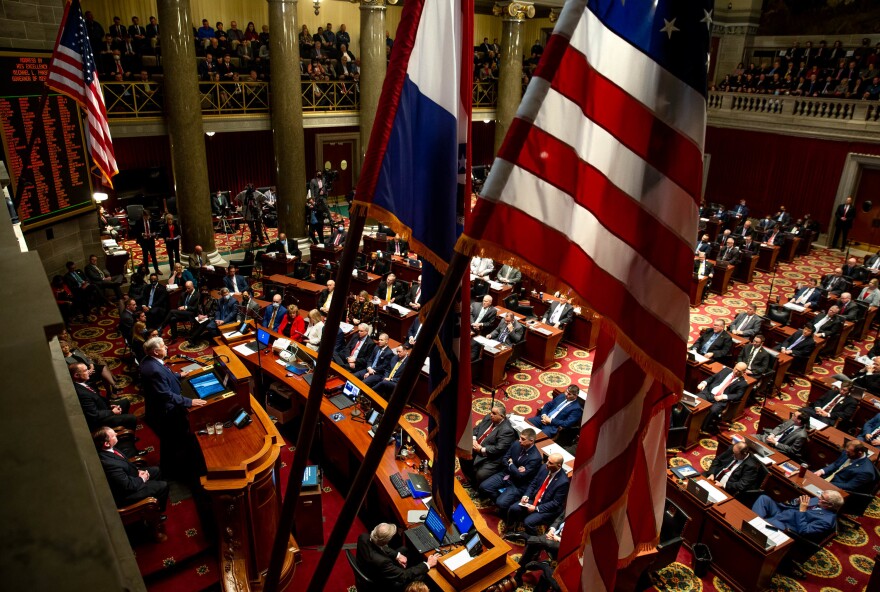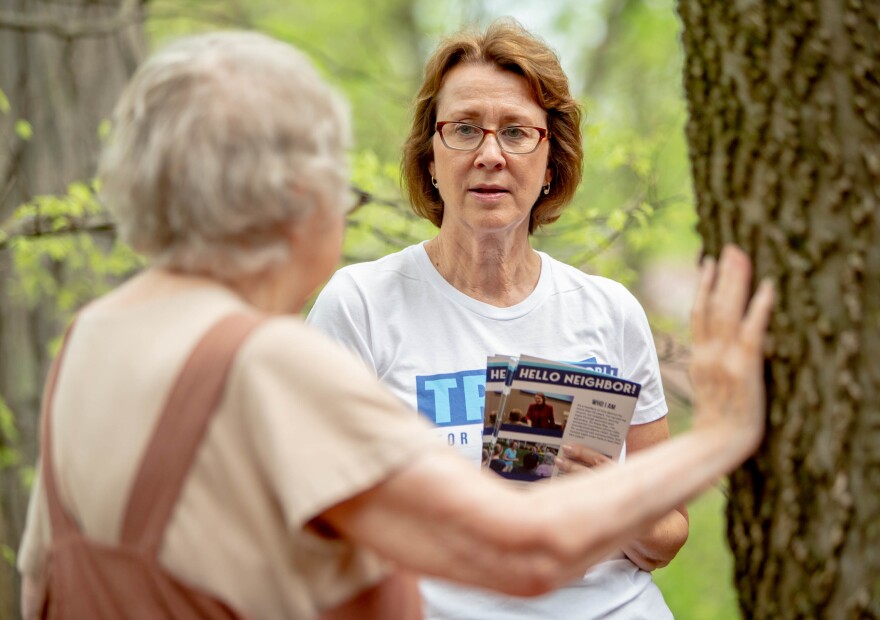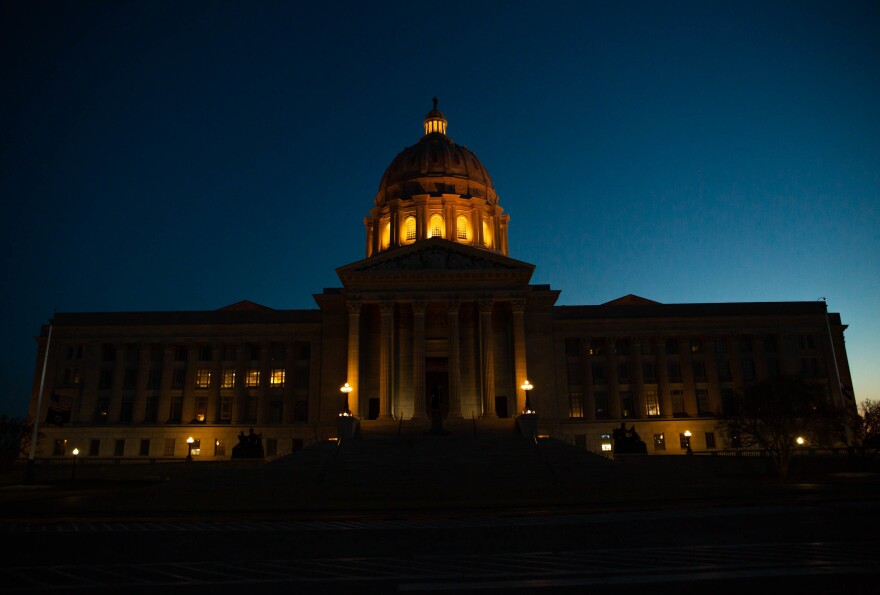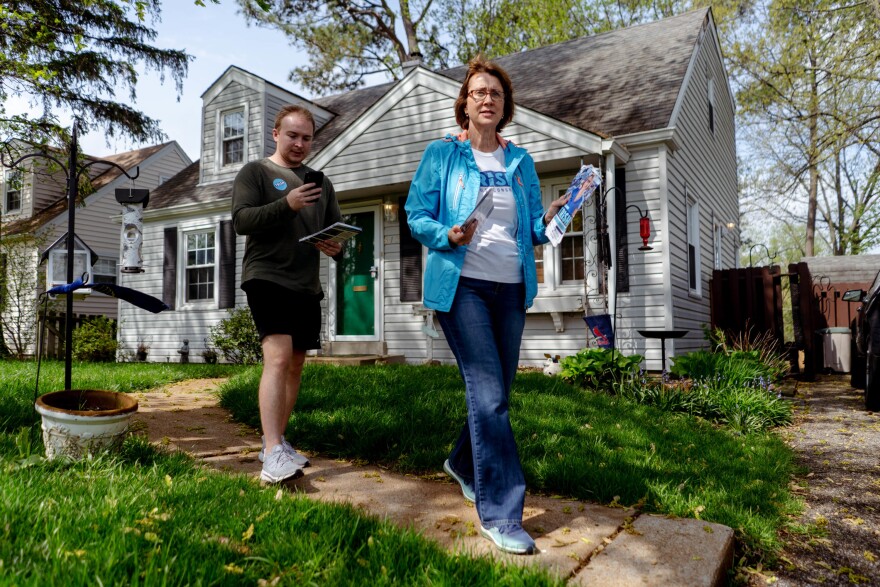
Campaigning in front of a group of seniors in Brentwood, Mo., Democrat Ray Reed has no idea whether the people he's asking to vote for him will ever see his name on their ballot.
Brentwood currently sits in the 2nd Congressional District, represented by Republican Ann Wagner. It's the district Reed hopes to win in November, but thanks to a monthslong redistricting fight between Republicans in the Missouri legislature, Reed and other candidates are in the dark about the boundaries of their districts.
"Republicans control just about everything in Jeff City," says Reed, referring to Missouri's capitol. "It really kind of speaks to their incompetence that you have all the power and all the votes — and you guys can't get something as simple as a constitutionally required congressional map done."
It's possible that Republican lawmakers could come up with a last-minute plan before the legislative session is done for the year. But if that doesn't happen, it's not clear how — or whether — courts will intervene, even though everyone agrees the lines drawn in 2011 would be unconstitutional for the August primary in 2022.
State Rep. Trish Gunby, a Democrat, has had a front-row seat to what she calls the "dysfunction." She is also trying to unseat Wagner and says the redistricting process is unlike anything she's seen or expected in her legislative career.
"I started serving during the pandemic," Gunby says. "I thought that was going to be the weirdest time. We came back last year — still weird. We thought things would normalize. And I have spoken to people who have been in the building for longer than I [have]. They've been around 20 or 30 years, and they say this is the most dysfunction they've ever seen."

Dysfunction junction
Like every other state, Missouri was late to redraw its eight congressional districts thanks to delays in U.S. Census data. But as of this week, Missouri lawmakers still haven't come up with final lines for a multitude of reasons — from disagreements on where to put military bases, to a tussle between Republicans about how GOP-leaning to make the overall plan.
The biggest fight, though, is what to do with the 2nd Congressional District, which contains portions of St. Louis' metro area. Some want to keep the district primarily suburban, while others want to add rural counties that have voted decisively for Republicans in recent years.
Ben Samuels is also running for the 2nd District as a Democrat. He's raised more than a million dollars, hired staffers and is trying to connect with voters in a decidedly suburban district that's split relatively evenly between Republicans and Democrats.

Like Reed and Gunby, Samuels is bewildered as to why Missouri is such a straggler when it comes to finishing redistricting.
"The craziest part about this whole process is no one even gives lip service to 'let's do something that's best for the voters, ' " Samuels says.
Because of the impasse, candidates around the state are having to visit places that may not end up in the final version of the voting map for Congress.
State Rep. Sara Walsh is running for a heavily Republican district that takes in portions of central and western Missouri. She was at a Lafayette County GOP gathering recently, even though there's no guarantee that Republicans there will get the chance to vote for her in the 4th District.
"Just as is the story of my life, you just work extra hard," Walsh said at the gathering.
GOP state Sen. Rick Brattin, who is also seeking the 4th District seat, says the redistricting stalemate is similiarly affecting his congressional campaign. Both Walsh and Brattin are campaigning in a district that, no matter which way it's drawn, will be wider than the state of Connecticut.
"You just have to expand where the lines may be," Brattin says. "I try to use the current 4th Congressional as the guide."
State lawmakers are trying to revive the process by moving an alternative map through the legislature, but the proposal is still likely to engender opposition from both parties, especially since it splits a number of counties.
Republican state Rep. Dan Shaul says that he is hoping that lawmakers can pass a map before they adjourn for the session.
"I think there's motivation ... on both sides of the aisle to be in control of what the map looks like — to fulfill our constitutional obligation," says Shaul, who is in charge of a House committee overseeing congressional redistricting.

Cloudy resolution
If lawmakers don't pass something before May 13, there's no question that Missouri would be violating both state and federal guidelines around how congressional districts need to have equal populations.
What the remedy to that problem is, though, isn't so clear.
There have been state and federal lawsuits over the lack of progress on congressional redistricting. But Secretary of State Jay Ashcroft, a Republican, notes there's nothing in the Missouri Constitution giving judges the authority to draw congressional lines. (By contrast, there is very specific language stating that a panel of appellate judges draw state legislative maps if state Senate and state House commissions deadlock.)
"They don't just get to decide we're going to do something we don't have the authority to do," Ashcroft says. "I don't get to decide I have the authority to just pull people over like I'm a highway patrolman. I'm not."
Ashcroft says there is precedent for federal judges to redraw congressional districts. But he contends there's a good chance they may leave the current map in place because of a judicial precedent known as the Purcell principle. That's when judges don't intervene in election-related matters close to the date voters go to the polls.
"If we don't get a map that's passed, neither the state courts nor the federal courts have the authority to change it," Ashcroft says. "And we'd just follow [federal law] that says 'if you don't come up with a new map, you just follow the old map.' "
But it's possible that the Purcell principle wouldn't apply in Missouri's case, according to Travis Crum of Washington University in St. Louis School of Law. Unlike other states in which it was invoked, like Alabama, Missouri lawmakers have failed to produce any sort of map. He says the likely outcome is that either a panel of federal judges or a "special master" will end up drawing the lines.
"What would happen in a state like Missouri is the judges would draw a 'least changed' map," Crum says. "They would look at the map. They would make very minor adjustments to achieve population equality, and they would let that map go into place."

Election uncertainty
Regardless of whether the map remains the same as it's been since 2011 or is changed slightly, the 2nd Congressional District (Wagner's district) would still be fairly competitive, which means the winner of the Democratic primary could have access to national resources after August. If lawmakers come up with some sort of deal, it's likely that the 2nd District will be relatively safe for the GOP.
For her part, Wagner said in a statement that she hopes the legislature "can come to an agreement and do their constitutional duty which is to draw a congressional map as they are supposed to do in conjunction with the census every 10 years." Wagner won in 2020 against a top-tier Democratic opponent by more than 6 percentage points in 2020.
"I am a filed candidate for Missouri's 2nd congressional district," Wagner said. "I am going to run, I am going to win, I am pleased and honored to serve in any district that the Missouri legislature decides to draw."
Candidates aren't the only ones irked by the lack of a redistricting resolution. Election officials like Rick Stream say that they're running into hard deadlines before the Aug. 2 primary — including a June one to send out ballots to overseas military personnel.
Stream says the lack of clarity is not only making it difficult to inform candidates which precincts they're in — it's also a disservice to voters.
"I don't know what the legislature is thinking about when they've got candidates in their own legislature that are running for positions in their own congressional districts," Stream says. "It's just going to make it even more of a mess and delay it even further."







